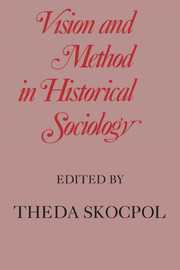Book contents
- Frontmatter
- Contents
- Preface
- 1 Sociology's Historical Imagination
- 2 The Social and Historical Landscape of Marc Bloch
- 3 Beyond the Economistic Fallacy: The Holistic Social Science of Karl Polanyi
- 4 Configurations in History: The Historical Sociology of S. N. Eisenstadt
- 5 Theoretical Generalization and Historical Particularity in the Comparative Sociology of Reinhard Bendix
- 6 Destined Pathways: The Historical Sociology of Perry Anderson
- 7 E. P. Thompson: Understanding the Process of History
- 8 Charles Tilly's Collective Action
- 9 The World System of Immanuel Wallerstein: Sociology and Politics as History
- 10 Discovering Facts and Values: The Historical Sociology of Barrington Moore
- 11 Emerging Agendas and Recurrent Strategies in Historical Sociology
- An Annotated Bibliography on Methods of Comparative and Historical Sociology
- Notes on the Contributors
7 - E. P. Thompson: Understanding the Process of History
Published online by Cambridge University Press: 05 June 2012
- Frontmatter
- Contents
- Preface
- 1 Sociology's Historical Imagination
- 2 The Social and Historical Landscape of Marc Bloch
- 3 Beyond the Economistic Fallacy: The Holistic Social Science of Karl Polanyi
- 4 Configurations in History: The Historical Sociology of S. N. Eisenstadt
- 5 Theoretical Generalization and Historical Particularity in the Comparative Sociology of Reinhard Bendix
- 6 Destined Pathways: The Historical Sociology of Perry Anderson
- 7 E. P. Thompson: Understanding the Process of History
- 8 Charles Tilly's Collective Action
- 9 The World System of Immanuel Wallerstein: Sociology and Politics as History
- 10 Discovering Facts and Values: The Historical Sociology of Barrington Moore
- 11 Emerging Agendas and Recurrent Strategies in Historical Sociology
- An Annotated Bibliography on Methods of Comparative and Historical Sociology
- Notes on the Contributors
Summary
Most historical sociologists know E. P. Thompson as the author of The Making of the English Working Class, published in 1963. Most have probably read part, but not all, of this book, which they view as a superb work of social history and a welcome departure from a simplistic or economist Marxism. Widely praised for its contribution to the new “history from below,” which in a sense the book itself helped to create, Thompson's masterpiece tells the story of the “blind alleys, the lost causes, and the losers themselves” that history usually forgets. Yet, however much they might admire him as a social historian and a compelling literary stylist, most historical sociologists do not see theoretical relevance in Thompson's work. A perceived lack of theoretical generalization and explicit methodology in Thompson's social history has been used to account for his meager impact on sociologists, despite his influence among historians.
Embedded in The Making of the English Working Class, however, is an implicit theory and method that Thompson subsequently has explicated through criticism of, and lively polemics with, other Marxists. The publication in 1978 of four of these long essays in one book, The Poverty of Theory and Other Essays, facilitates access to Thompson's perspective. The assumptions underlying Thompson's theory and method, however, still make them difficult to assimilate within sociology. Thompson offers a fundamental challenge to the positivism and empiricism that have shaped Anglo-American sociology and that have also influenced a large part of twentieth-century Marxism.
- Type
- Chapter
- Information
- Vision and Method in Historical Sociology , pp. 211 - 243Publisher: Cambridge University PressPrint publication year: 1984
- 8
- Cited by



